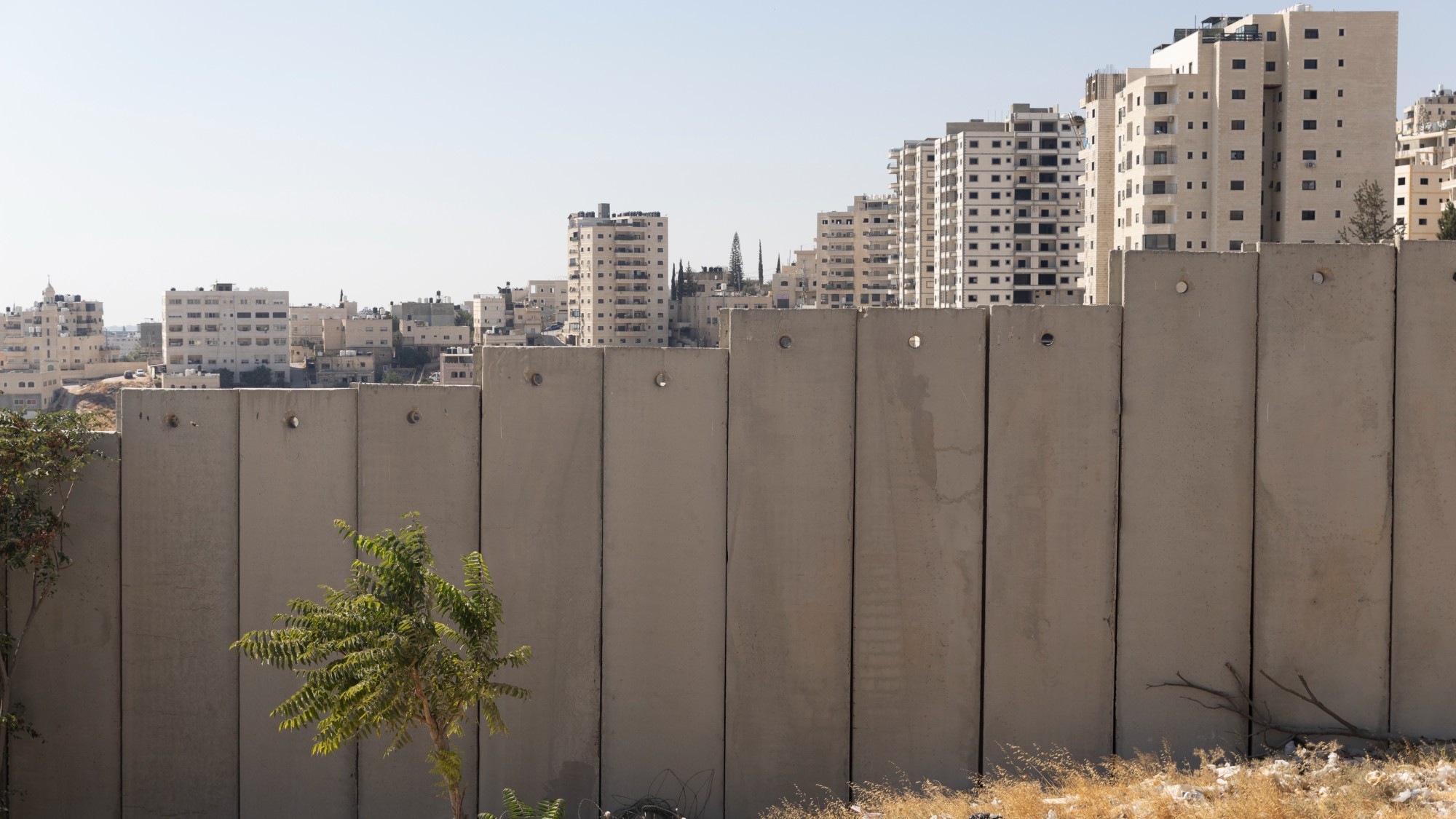Is an Israeli-Palestinian peace deal possible after the war?
The Israel-Hamas battle may seem intractable. But some leaders think peace is more necessary than ever.


A free daily email with the biggest news stories of the day – and the best features from TheWeek.com
You are now subscribed
Your newsletter sign-up was successful
Even as war rages between Israel and Hamas in Gaza, some officials are pondering what comes afterward. The New York Times reported that Secretary of State Antony Blinken hopes for a "sustained peace" that resolves the seemingly unending Israeli-Palestinian conflict. That peace "must include Palestinian-led governance and Gaza unified with the West Bank under the Palestinian Authority," he said this week at the G7 meeting in Tokyo. But Blinken made his call without explaining how the warring parties might overcome "pressing obstacles."
One of those obstacles: Israel's leaders aren't quite sure what should come next. The Associated Press reported that Benny Gantz, a member of the country's war cabinet, "acknowledged that Israel does not yet have a vision for the Gaza Strip after its war against Hamas ends." Once the fighting stops "we will settle down and review an alternative mechanism for Gaza," Gantz said. But, he added: "I do not know what it will be."
Still, The Economist noted, some leaders see the conflict as a new opportunity "to revive the comatose Israeli-Palestinian peace process." Western leaders — President Joe Biden, British Prime Minister Rishi Sunak and French President Emmanuel Macron — believe that any plan for the "day after" the Gaza war ends "needs to consider the possibility of a two-state solution." But there is a lot of fighting that will be done between now and then. "For now, that is a far-off dream."
The Week
Escape your echo chamber. Get the facts behind the news, plus analysis from multiple perspectives.

Sign up for The Week's Free Newsletters
From our morning news briefing to a weekly Good News Newsletter, get the best of The Week delivered directly to your inbox.
From our morning news briefing to a weekly Good News Newsletter, get the best of The Week delivered directly to your inbox.
What the commentators said
"As dark as things seem, the war in Gaza could end up restarting the peace process," Tony Klug argued at The Guardian. From the "ashes of the present wretchedness," it's possible to see a path to progress between Israel and Palestine. One sign of hope: "Every peaceable advance since 1967 has been provoked by an unforeseen seismic event." The Yom Kippur War led to the Israel-Egypt peace treaty; the first Palestinian intifada ended with the 1993 Oslo Accords. "It is possible that the current outrage will track the same pattern."
"The costs of an unresolved Israel-Palestine conflict are exorbitant," Eric Levitz added at New York. Since Israelis and Palestinians began discussing the possibility of a two-state solution during the 1990s, "the prospects for peace have only dimmed." But there is "some basis" to hope the current conflict will lead Israeli leaders to re-engage the peace process. For one thing, the failure of the right-wing government to prevent Hamas' Oct. 7 attack could lead to a new more moderate government. But those hopes are still distant. "At the moment, any proposal for peacefully resolving the Israel-Palestine conflict can look hopelessly naïve."
"All previous wars between Israel and Hamas have ended up with the status quo ante," Brent E. Sasley wrote at Politico. And neither side seems prepared to break old habits. Any move toward peace would require Israel to halt West Bank settlements and to remove its longstanding blockade on Gaza; Hamas would have to "end its commitment to violence and improve governance of Gaza." Will that happen? "The sheer number of deaths" on both sides might force an unlikely resolution.
What next?
There may be some hope. The Palestinian Authority, which administers the semiautonomous areas of the West Bank, said Thursday it is open to helping govern postwar Gaza "if the United States commits to a full-fledged two-state solution to end the Israeli-Palestinian conflict," The New York Times reported. That message is "a relief and a challenge" to U.S. officials as they seek an endgame in the conflict.
A free daily email with the biggest news stories of the day – and the best features from TheWeek.com
"I believe that the chances for negotiating peace today is paradoxically bigger than just a month ago," Yossi Beilin, an Israeli who helped devise the Oslo process, told NPR. Along with Hiba Husseini, a former legal adviser to Palestinian peace negotiators, he is promoting the "Holy Land Confederation" — a two-state solution that would allow free movement between Israel and Palestinian-controlled areas. The pair believe the "urgency in addressing this conflict" creates the possibility for a lasting peace. "I mean," said Husseini, "what's the other option, really?"
Joel Mathis is a writer with 30 years of newspaper and online journalism experience. His work also regularly appears in National Geographic and The Kansas City Star. His awards include best online commentary at the Online News Association and (twice) at the City and Regional Magazine Association.
-
 What to know before filing your own taxes for the first time
What to know before filing your own taxes for the first timethe explainer Tackle this financial milestone with confidence
-
 The biggest box office flops of the 21st century
The biggest box office flops of the 21st centuryin depth Unnecessary remakes and turgid, expensive CGI-fests highlight this list of these most notorious box-office losers
-
 The 10 most infamous abductions in modern history
The 10 most infamous abductions in modern historyin depth The taking of Savannah Guthrie’s mother, Nancy, is the latest in a long string of high-profile kidnappings
-
 ‘Bad Bunny’s music feels inclusive and exclusive at the same time’
‘Bad Bunny’s music feels inclusive and exclusive at the same time’Instant Opinion Opinion, comment and editorials of the day
-
 Is the Gaza peace plan destined to fail?
Is the Gaza peace plan destined to fail?Today’s Big Question Since the ceasefire agreement in October, the situation in Gaza is still ‘precarious’, with the path to peace facing ‘many obstacles’
-
 ‘No one is exempt from responsibility, and especially not elite sport circuits’
‘No one is exempt from responsibility, and especially not elite sport circuits’Instant Opinion Opinion, comment and editorials of the day
-
 ‘Human trafficking isn’t something that happens “somewhere else”’
‘Human trafficking isn’t something that happens “somewhere else”’Instant Opinion Opinion, comment and editorials of the day
-
 Trump’s ‘Board of Peace’ comes into confounding focus
Trump’s ‘Board of Peace’ comes into confounding focusIn the Spotlight What began as a plan to redevelop the Gaza Strip is quickly emerging as a new lever of global power for a president intent on upending the standing world order
-
 How Iran protest death tolls have been politicised
How Iran protest death tolls have been politicisedIn the Spotlight Regime blames killing of ‘several thousand’ people on foreign actors and uses videos of bodies as ‘psychological warfare’ to scare protesters
-
 The Board of Peace: Donald Trump’s ‘alternative to the UN’
The Board of Peace: Donald Trump’s ‘alternative to the UN’The Explainer Body set up to oversee reconstruction of Gaza could have broader mandate to mediate other conflicts and create a ‘US-dominated alternative to the UN’
-
 Israel’s E1 zone in the West Bank: the death of the two-state solution?
Israel’s E1 zone in the West Bank: the death of the two-state solution?The Explainer Controversial new settlement in occupied territories makes future Palestinian state unviable, critics claim
